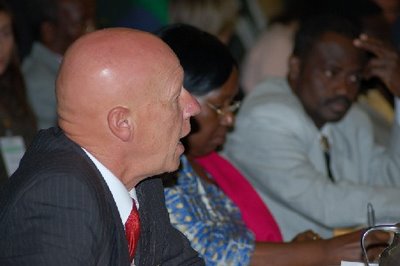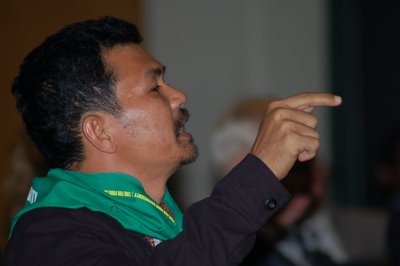 Following a workshop on international support for agriculture and hunger this morning, there was again opportunity for participants to address the entire assembly. The farmers had the last word in the sessions on Monday; today it was the World Council of Churches. Below is their statement:
Following a workshop on international support for agriculture and hunger this morning, there was again opportunity for participants to address the entire assembly. The farmers had the last word in the sessions on Monday; today it was the World Council of Churches. Below is their statement:The World Council of Churches is the international representation of more than 300 non-catholic Churches from all continents. Even if Church-related development agencies in all parts of the world are part of our ecumenical movement, and many of these agencies run emergency aid programmes, development as such is not our focus. We strive for justice, peace, liberation, humanity of the poor and the integrity of creation.
I apologise if the point I want to make is somewhat outside the restricted agenda of aid and investment. But coming from a church organisation, you might allow me to make a more ethical intervention.
God loves all people and all of creation. God is on the side of the poor and the suffering. Thus we are called to also love the victims of hunger and poverty and to act as their advocates.
In the FAO documents, which we appreciate in their professional standards, we miss however this spirit of love and trust in the people. Who exactly are the hungry we talk about? Do we really know enough about their fates and life? Do we really care about their suffering, or is combating hunger just a matter of improving statistics?
The Hunger Task Force has discovered that the hungry are especially those people who live close to nature: the peasants, the livestock keepers, the nomads, the fishermen, the indigenous. Their livelihoods are more and more threatened, because their means of survival have constantly been eroded by the powerful of the world.
We have to face one fact - there cannot be poverty elimination without getting into conflict with vested interests. The struggle for survival of the poor in many instances goes against the powerful forces: the investors, the market forces, globalisation, inhumane technologies, racist policies, robbery of their resources, ecological destruction of their means of production and the dumping of overproduction from rich countries.
We appeal to the distinguished delegates not to neglect the conflict potential of combating hunger. In most cases there is no win-win-situation. If you really mean it, hunger reduction, you have to know whose side you are on in case of conflict.
We find it one-sided to put investment on top, if you forget to mention what poor producers really need. We cannot agree to put a new green revolution high on the agenda, and then neglect participation by the poor in determining the course and nature of that ‘revolution’. If you talk about pro-poor development, pro-poor biotech, pro-poor trade, pro-poor financial systems, but you have not gained a deeper insight into the system of livelihoods of the poor, it risks being a masquerade for the interests of the rich and powerful.
The logic and perspective of the poor peasants differ from the ideas of the rich. It is not their concern to increase the growth of GNP, to base their lives on the statements of economists in their efficient calculations. They have to follow their own rationality, which is the rationality of risk minimization. They try to achieve this by diversification. That is distinct from the rationality of profit maximisation, which follows the pursuit of the economics of scale by specialisation.
We are convinced that real progress for poverty reduction cannot achieved without the intensive participation of the poor. The laboratories will not bring freedom from hunger, but only the self-determination of the victims themselves over what they need and what not. We expect FAO to be on the side of the poor producers, not on the side of the technocratic answers.
For us participation poor people in their own development is the key. By participation we understand something distinct from what you call stakeholder dialogue, targeting aid or finding acceptability for pre-set solutions.
The poor producers have to be put in the driver’s seat to drive the programmes; researchers, investors, governmental officials and international experts need to learn how to be co-pilots.
Mr. Chairman, we did not find the term “participation” in the FAO-Documents. It is missing. We ask you, “Is this coincidence, or is it a sign of lack of trust in the poor?”
We want to alert you that there will be no success of any pro-poor strategy, independent of the sincerity of your good intentions, if it remains a simple top-down approach.
For us food sovereignty does encompass the participatory approach, we are critical of trusting the remote forces of globalisation driven by a corporate agenda.
Rudolf Buntzel Representative of the World Council of Churches to the Special Session of the FAO Committee on Food Security, Oct. 31st, 2006

 With these words Jack Wilkinson, a farmer from northern
With these words Jack Wilkinson, a farmer from northern 